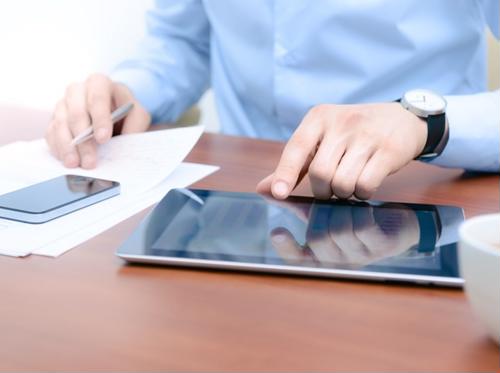


Recent advancements in technology have put mobile devices in the spotlight in the healthcare industry. More physicians and specialists are harnessing the power, mobility and convenience of smartphones and tablets in clinical settings, using them to view electronic medical records, schedule appointments and display clinical information for patients without the need of a full personal computer setup. The increasing prominence of these platforms in healthcare settings has spurred an accelerated development of medical software applications.
The wide array of options when it comes to mobile technology leaves many practices to choose which is best: the smartphone, iPad or a combination of both. Consider the pros of each one carefully to make the most of mobile technology in your practice.
"Over 80 percent of physicians use smartphones for professional purposes."
Optimal Portability with the Smartphone
Most people own their own smartphones, and many use them for both personal and professional purposes. Physicians are no exception. According to eMarketer, a Kantar Media survey conducted in March 2015 found that 84 percent of physicians in the U.S. used smartphones for professional functions. That's an increase of about 5 percent from the previous year. For comparison, only 56 percent of physicians polled stated that they used tablet PCs for clinical purposes.
The smartphone offers a wide variety of benefits to physicians. One of the most highly touted perks is that it puts endless amounts of information right in the palm of the doctor's hand - a clinician can use the power of the Internet to look up symptoms, diagnosis information and potential treatment options very quickly. This not only saves time but can provide more accurate diagnoses and better care outcomes. Twitter users have even chimed in on the need for mobile tools that provide doctors with limitless knowledge.
Diagnosis : 'to know completely' no longer the sole territory of doctors. Smart phone holds key to future diognosis #DecodingMe
— annie auerbach (@annieauerbach) March 16, 2015
The Economist | Medical apps: Smartphone diagnosis... In the future the apps will assist in monitoring your health http://t.co/M5p8AWVKBz
— GEOFF DAVIS (@jazzgeoffda) March 12, 2015
In addition to providing a wealth of knowledge to physicians, smartphones can help improve efficiency in clinical practice management and workflow. For example, Nextech's NexSync feature allows doctors to manage their schedulers at any time and place. It provides automatic synchronization that means appointments are updated, added and canceled in real time for supreme accuracy.
 Tablet PCs are becoming commonplace in clinical settings.
Tablet PCs are becoming commonplace in clinical settings.One-the-Go Charting with a Tablet
More physicians are using smartphones in today's clinical setting, but this may be largely due to the fact that more people own these mobile devices and that smartphones have been around longer. With its growing popularity for everyday use, the tablet is quickly becoming a regular fixture in the clinical setting. The smartphone is most widely used for diagnostic reference materials, but the tablet is most commonly used among doctors to access medical publications and electronic medical records, which are best viewed on a larger screen.
For example, Nextech's iPad application allows physicians to bring their charts with them while moving between examination rooms, take photos for easy integration into EHR systems and even dictate directly into the chart. This feature enables doctors to easily view the screen alongside patients to help make them more informed and engaged in the clinical process, increasing their patient engagement and mobility.
Both the smartphone and tablet PC have their own utile places in the clinical setting. Mobile devices are generally best used by physicians for diagnostic assistance, while tablets are ideal for larger viewing and sharing with patients. Incorporating both of these mobile devices as well as Nextech's mobile platform solutions can help improve the care quality and clinical workflow of your practice.
HERE ARE SOME RELATED ARTICLES YOU MAY FIND INTERESTING
Revenue Cycle Management | Healthcare Technology
Setting the Revenue Cycle for Success
By: Nio Queiro | August 29th, 2024
How Healthcare Chatbots Help Clinics Provide Better Care
By: Nextech | May 31st, 2024